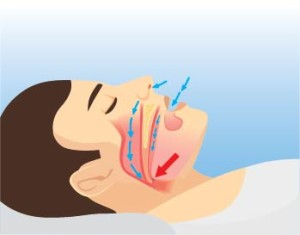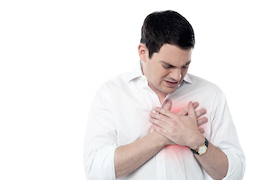Most of us don’t think of snoring as something to be overly concerned about. However, frequent loud snoring is not only a health issue but it can also be a sign of sleep apnea. Millions of people suffer from sleep apnea, a constriction of the airway from collapsing throat tissues and/or the tongue blocking the airway during sleep. Even though sleep apnea is treatable, it often goes unrecognized, which can be dangerous and detrimental to your health, making it vital to visit your dentist if you suspect that you or a loved one might have sleep apnea.
Sleep Apnea
Our Location
410 Rosedale Court, Suite 170,
Warrenton, VA 20186
540-717-9819
What is Obstructive Sleep Apnea?
Obstructive sleep apnea (OSA) is a sleep-related breathing disorder that prevents airflow during sleep. OSA occurs when the tissue in the back of the throat collapses temporarily blocking the airway, which keeps air from getting into the lungs. When your blood-oxygen level drops low enough, the body wakes up. It happens so quickly that the sleeper may not even remember the arousal.
The signs and symptoms of obstructive sleep apnea can often include the following:
- Snoring
- Excessive daytime sleepiness
- Gasping or choking during the night
- Non-refreshed sleep
- Fragmented sleep
- Clouded memory
- Irritability
- Personality changes
- Morning headaches.
Subconsciously waking up hundreds of times a night disrupts normal sleep patterns and can make a person feel very tired and un-refreshed the next day. The frequently associated snoring creates its own health issues and, in addition, even disrupts the normal sleep patterns of those in your household.
Negative Effects of Sleep Apnea
Sleep apnea patients are more likely to suffer from strokes, heart problems and high blood pressure, as well as a higher incidence of work and driving-related accidents. There is even some association of sleep apnea with Alzheimer’s Disease. Further, the risk of sleep apnea increases with additional body weight because excess tissue in the back of the throat can narrow and block the airway even more.
The signs and symptoms of OSA include snoring, excessive daytime sleepiness, gasping or choking during the night, non-refreshed sleep, fragmented sleep, clouded memory, irritability, personality changes and morning headaches.
By visiting Dr. Bonnie Foster, non-CPAP users can be treated for snoring and obstructive sleep apnea with a comfortable dental device to help open your airway. No longer do you have to lose sleep over snoring or sleep apnea. Contact Dr. Foster to discuss treatment options for your sleep apnea that can literally change your life!



